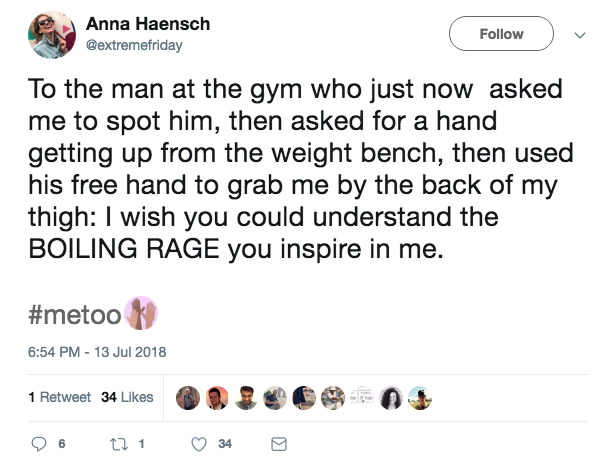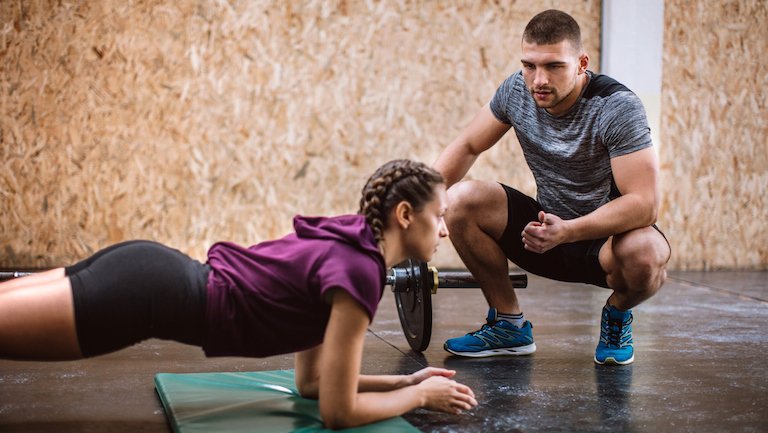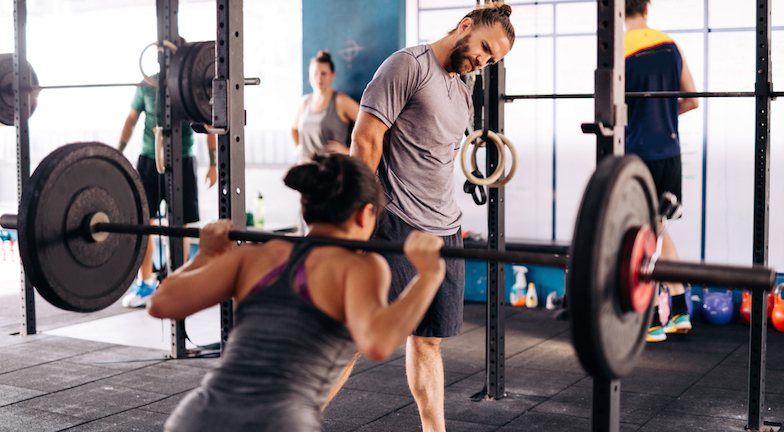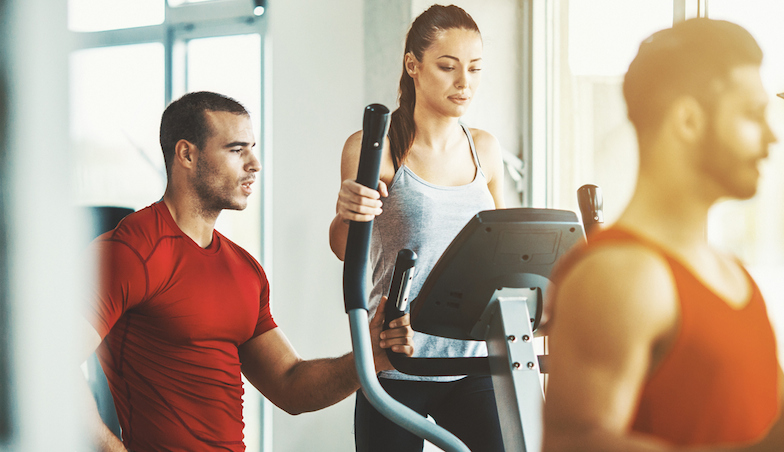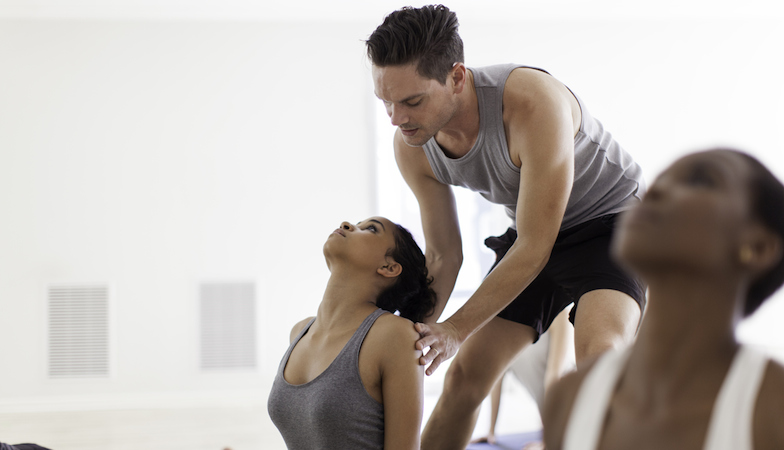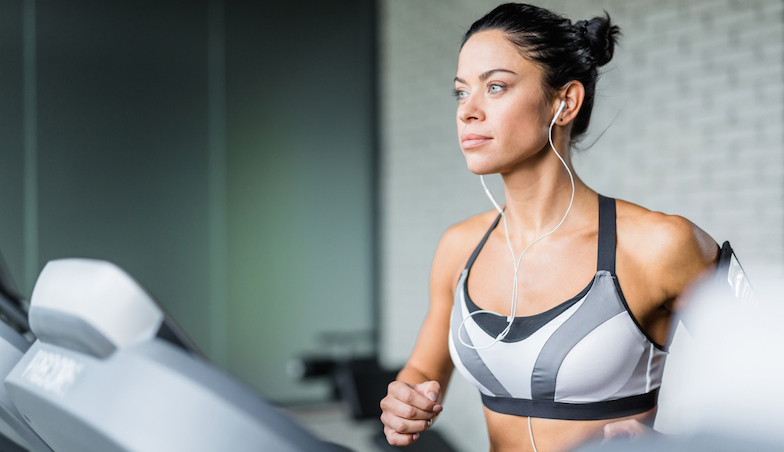We all have the right to feel comfortable and empowered in the gym but a worrying trend in men harassing women while they exercise is threatening this, with one in five women quitting their gym memberships. Samantha O’Brien reports – and we hear #metoo in the gym stories from Healthista readers
The #MeToo movement has regained its position in mainstream media a year after it began. In fact, a new study has revealed that 71% of women are being harassed at the gym on a regular basis. With 82% of women changing their gym routine because they were being followed around the gym.
The study was conducted by FitRated, and also found that more than 90% of women said they don’t like being stared at while exercising. Plus, one in five women were found to have even cancelled their gym membership because of this very reason.
Though #MeToo may have acutely disappeared from the front pages of newspapers in the absence of rich business men being accused (which we now know may only be because of non-disclosure agreements, as reported by the Independent), sexual misconduct remains a persistent and unwelcome presence in all women’s lives, and most perpetrators aren’t billionaire businessmen.
An area that this is particularly normalised, yet exponentially common in, is the fitness world. This is a conversation that can no longer be disregarded as ‘friendliness’ or justified by tight gym leggings.
This is a conversation that can no longer be disregarded as ‘friendliness’ or justified by tight gym leggings
If you’re anything like me, there is nothing more rewarding than the shaky walk home after a leg day. Endorphins racing through your body, music blasting in your ears, a deep burn through your glutes.
But it wouldn’t be a leg day without the gaze of the man behind you latched onto every movement of your buttocks whilst you’re under the squat rack. There is actually a name for this, it’s called ‘eye-groping’.
It’s not just seriously annoying to be bothered while you’re trying to work out, it can also make women feel unsafe or emotionally triggered
In recent times, a lot of women have jumped onto the weight-training trend to get stronger and leaner. The movement of women into the – previously male dominated – weights section of the gym is empowering and overdue.
But conversely, it often results in uncomfortable, even unsafe, situations for women.
It’s not just seriously annoying to be bothered while you’re trying to work out, it can also make women feel unsafe or emotionally triggered.
As a result, women have taken to Twitter and reported their experiences using the #MeToo hashtag.
There is, however, a growing awareness of this problem, and fitness organisations are starting to tackle it.
NBC News have discussed the lengths to which some gyms are going in America to ensure women’s safety, flagging up Rebel Fitness Club, a boxing-oriented gym outside of Detroit, Michigan, where you’re greeted by a sign declaring the space’s zero-tolerance policy for harassment, violence and abuse as you walk-in.
Meanwhile, in a UK-first, leading yoga studios Triyoga last Friday launched the use of consent cards that participants can leave on their mats during yoga class. These signal to the teacher that the participant would rather not be physically touched by way of adjustment that day.
Genny Wilkinson Priest, yoga teacher, journalist and yoga manager at Triyoga has previously reported on incidences of sexual abuse in yoga for this website.
Healthista readers’ stories of #metoo in the gym
We asked our readers to share their experiences of sexual harassment and uncomfortable experience in the gym and yoga, and unsurprisingly, we had a lot of responses.
‘He would secretly film my bum and post it on his Snapchat’
‘I used to love going to the gym because I was so invested in my fitness, but there was this one guy who used to film my bum while I was on the machines at Holywell Fitness Centre, Loughborough.
I didn’t know until one of our mutual friends told me he used to post them on his Snapchat. He showed me and I broke down because I felt so objectified and unsafe. I didn’t end up going back to the gym for about a year after and had to completely change the gym I loved’.
I felt so objectified and unsafe. I didn’t end up going back to the gym for about a year after
Loughborough University responded to this saying;
‘As far as we have been able to establish today, the University was not aware of the issues raised by your reader. We would urge anyone using our facilities to report incidents of inappropriate behaviour immediately to a member of staff. Concerns can also be flagged via the University website. Loughborough prides itself on being an inclusive community and will investigate any reports of harassment’.
‘They kept approaching, regardless of my saying ‘no”
‘I’ve had multiple occasions where men have stared and then approached me, calling me beautiful and asking me out for drinks. These men were of all ages, but mostly older than 30 from my observation which makes me feel a bit uncomfortable, as at the time I was no older than 19.
They don’t take notice of the fact that you’re saying no or that you have a boyfriend. Another time, I have had men offering me free PT sessions which also made me feel uncomfortable’.
‘He messaged me: ‘I need to see you under that squat rack’
‘At my gym there was a guy who worked there who I vaguely knew of through mutual friends, but he never used to speak to me in person when I was there.
‘However, he always used to message me on social media saying things like ‘I need to see you under that squat rack’ and offering me free PT sessions which made me feel very uncomfortable, but as I saw him every time I went to the gym I felt as though I was being rude if I didn’t reply.
‘A few months later, one of my friends said that they had seen my sister and I on his Snapchat whilst we were working out, which made us both feel completely violated and disgusted.
‘Luckily, he doesn’t work there any more, but wherever he is now, he is probably still doing the same’.
‘It wasn’t quite sexual harassment but it did make me feel uncomfortable.’
‘I was on the lat pull down machine with my phone tucked into my sports bra and this man came over and interrupted me.
‘At first I thought he was talking about my form (which also often happens from men interfering), but then I realised he was saying I shouldn’t keep my phone there because of the waves from it being dangerous to ‘that area’.
‘I shrugged him off but I realised afterwards he must have had to have been paying special attention to my breast area in order to even notice it was tucked in there’.
‘He was just a generally creepy presence in the gym’
‘At my gym there was this one male PT who always used to ‘mansplain’. I would happily be working out and he’d come over and give his unsolicited advice about what else I could be doing. It made me feel embarrassed and uncomfortable.
‘Another time, whilst my friend and I were getting our body compositions analysed, he made inappropriate comments about us looking ‘pretty perfect’.
‘Whenever he was PTing, he’d always stand eerily close to girls whilst they squatted or used machines. He was just a generally creepy presence in the gym, but was subtle enough to get away with it’.
‘He would always be in the ladies changing room ‘cleaning’ every time I went in there’
‘At my gym there was a guy who worked there, and he always used to approach me while I was on the treadmill.
‘He’d say things like ‘you look amazing’. He would also always be in the ladies changing room ‘cleaning’ every time I went in there. It made me feel uncomfortable and irritated, and I used to dread going to the gym incase he was there.
‘He put his hand on my buttocks and started ‘breathing with me’ heavily into my ear’
‘I have been doing astanga yoga since the early 2000s. It’s a dynamic and sweaty form of yoga and very adjustment heavy.
‘A few years back, I went to this class on a Thursday evening in a London studio. The first time, during an adjustment during padunghasana 1, where you stand up and take one leg out, taking the toe and then move to the side (it requires much focus).
‘The teacher came and stood next to me, leaning his body close and into my side, he put his hand on my buttocks and started ‘breathing with me’ heavily into my ear. It was the weirdest thing and I’m sure it was just his way of teaching, but boy did it make me feel uncomfortable.
‘I told myself not to be so uptight and I love the style of yoga, so I went back the next Thursday. This time during the seated forward fold called Pashimottanasana, the same teacher came and literally lay his entire body on my back so I could feel every part of him. I felt really embarrassed and again thought ‘is that supposed to happen?’
I had been doing astanga yoga for a really long time by then and had been to all sorts of classes and had all sorts of adjustments, but this just didn’t feel right.’
‘He said: ‘I wish I was that step”
‘I used to do this amazing HIIT class at my local gym, a very famous chain in Stratford (East London). There was this instructor whose classes were great, but he would single women out and stand really close to them.
‘One time I was doing some squats over the step, and he came up to me and said close to my face: ‘I wish I was that step.’ I never did that class again.’
Why we need a Code Of Conduct for all gyms
After recognising this as a huge and under-reported issue, the next step is to give people practical and useful advice, to help implement change.
Healthista are proposing the following Code of Conduct for all gyms and yoga centres to adopt to help all of us feel safer.
#1 Observe body language
For the perpetrator: Some people utilise the gym as an opportunity to meet new people, maybe even in a romantic sense. However, it is important to understand when someone wants to be approached, and when they do not. If someone has earphones or headphones on and avoids eye contact, chances are they do not want to be spoken to.
if you wouldn’t say it to another guy in the gym, don’t say it to a woman
Invading their space and attempting conversation could make them feel uncomfortable, so assume that it is best to avoid speaking to them unless absolutely necessary.
‘Have you finished using the leg press?’ is fine. ‘Your squat form is amazing, can I take you for a drink?’ is not. As a general rule of thumb, if you wouldn’t say it to another guy in the gym, don’t say it to a woman.
For the victim: Though the onus shouldn’t fall onto the victim to amend their behaviours to avoid harassment, your body language could help to deter unwanted attention in the gym. Wearing headphones and avoiding eye contact will help portray the message that you want to be left alone.
Of course, unfortunately some men won’t understand or care that you don’t want to be approached. If this happens, make sure you report it. Chances are, they’ve done this to many other people, and the gym can do something about it (hopefully removing them so that you can work out in peace).
#2 Put an end to ‘eye-groping’
For the perpetrator: Just because you don’t physically touch someone, it doesn’t mean that you don’t have the power to make them feel extremely uncomfortable. Running with your head at a 90 degree angle because you are staring at a woman in the free weights area is not acceptable behaviour. And don’t think that because you’re staring at someone’s reflection that they can’t see you or that it’s okay. We can, and it’s not.
For the victim: Unfortunately, there really is no way to control someone else’s eye movements. However, reporting this is important. The more that this is encouraged, the more people will report it, and the more action gyms can take against it. You may feel like you are overreacting by reporting ‘eye-groping’, but if someone is making you feel uncomfortable, you have the right for action to be taken against them, and you’re almost definitely not the first person that they have done this to.
#3 Don’t cyber stalk
For the perpetrator: So the woman in front of you at the gym scans her member card and her name flashes on the screen, that you happen to catch a glimpse of. This is not an excuse to go and search, add and contact her on Facebook. This can be really scary for women, especially if they have experienced stalking before, which is entirely possible, as 20.9 per cent of women reported being stalked in a UK study.
For the victim: Again, this is obviously not the victim’s fault, but being safer online is something that we can all try and do. Ensuring that your profiles are private and that you have control over who can contact you should help to reduce these occurrences.
#4 Stop filming
For the perpetrator: This one really should speak for itself, but it is a common occurrence for women at the gym to be filmed without their consent or knowledge, as demonstrated by our readers’ stories. Just don’t do it. It’s a complete invasion of privacy, and can make people want to stop training altogether.
For the victim: This one is tricky, as often the victim is unaware that it is happening, perhaps for many weeks or months until someone tells them that they have seen them on another person’s social media. Unfortunately, as with our reader’s story, it can leave you feeling so violated that you want to leave your gym. However, if you know who the perpetrator is, report them. They should be the one to leave, not you, and your gym should take action against this.
#5 Don’t invade personal space
For the perpetrator: There really is no excuse for standing too close to somebody, unless you’re on the underground in rush hour. With the exception of someone explicitly asking for your help, don’t assume that the woman under the squat rack wants you to spot her. I can almost guarantee that she does not. And don’t hover uncomfortably close to someone when you are waiting to use a piece of equipment that they are on. The ‘would I do this if it was a guy?’ rule can be very useful here, too.
For the victim: At risk of sounding repetitive, report, report, report. Anything that makes you feel uncomfortable in the fitness world should be reported so that it can be investigated and sorted out. Your comment may be part of a larger picture that could help get a predator removed from the gym. This specific example seems to be a problem among personal trainers, so make sure you report them to the management team at your gym if this has happened or ever happens to you.
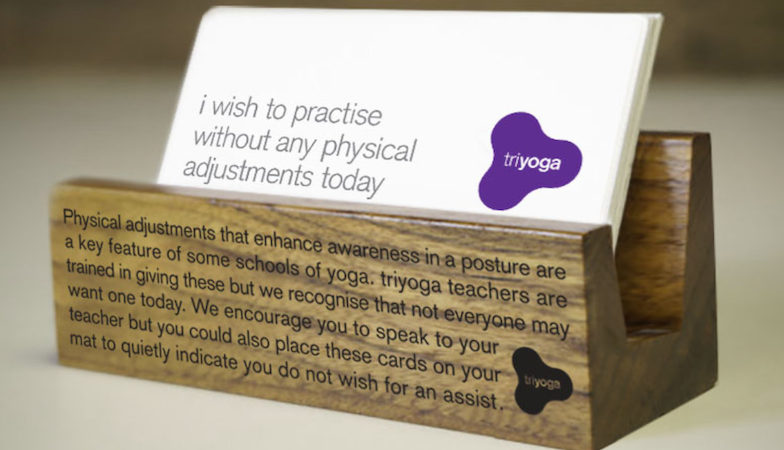
#6 Consider using consent cards
All fitness organisations can take a leaf out of Triyoga’s book. Consent cards are certainly a huge step in the right direction, as sexual abuse in yoga is a recognised problem. They help people to express their wishes in an easy and clear way.
Genny Wilkinson Priest says, ‘Some of us have experienced trauma in our lives and an adjustment or assist might be an upsetting trigger event, even in the safety of a yoga class’.
People’s boundaries and comfort levels can change on a daily basis, and these cards are a great way to help people communicate this. Bravo, Triyoga.
If more gyms and fitness classes implemented this, the tolerance and instance of sexual misconduct in the fitness world would likely fall tremendously.
And now, more than ever, women need to keep speaking up about their experiences so that the normalisation of sexual misconduct in the fitness world can be ended.
Have you been subjected to sexual harassment in the gym? Write to us in the strictest confidence editor@healthista.com
More Healthista Content:
Calling all women travellers – you can’t miss this event
This gadget makes Kegel exercises easy
Do all humans have a type…on paper?
Friendship therapy – Falling out with a friend
Like this article? Sign up to our newsletter to get more articles like this delivered straight to your inbox.




